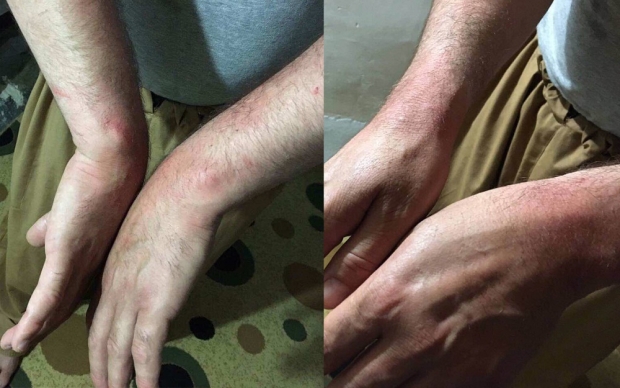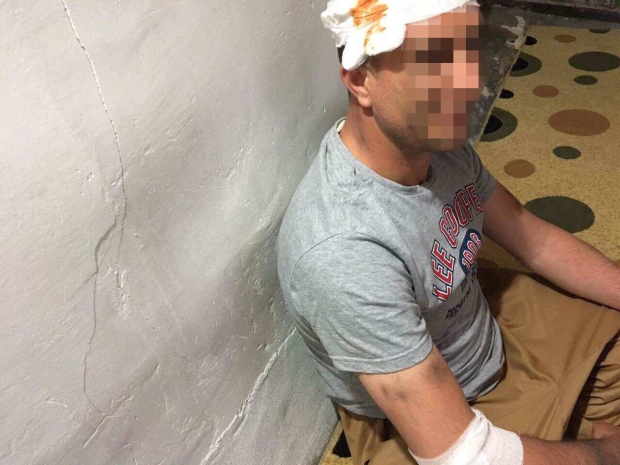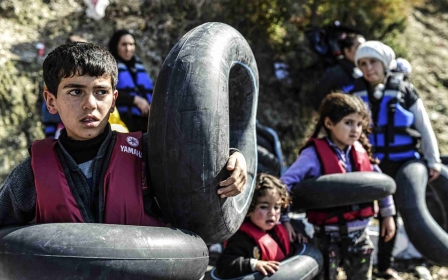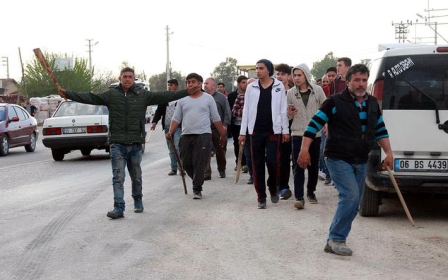Iraqi man 'bound, hooded and locked in plane toilet' during forced UK removal
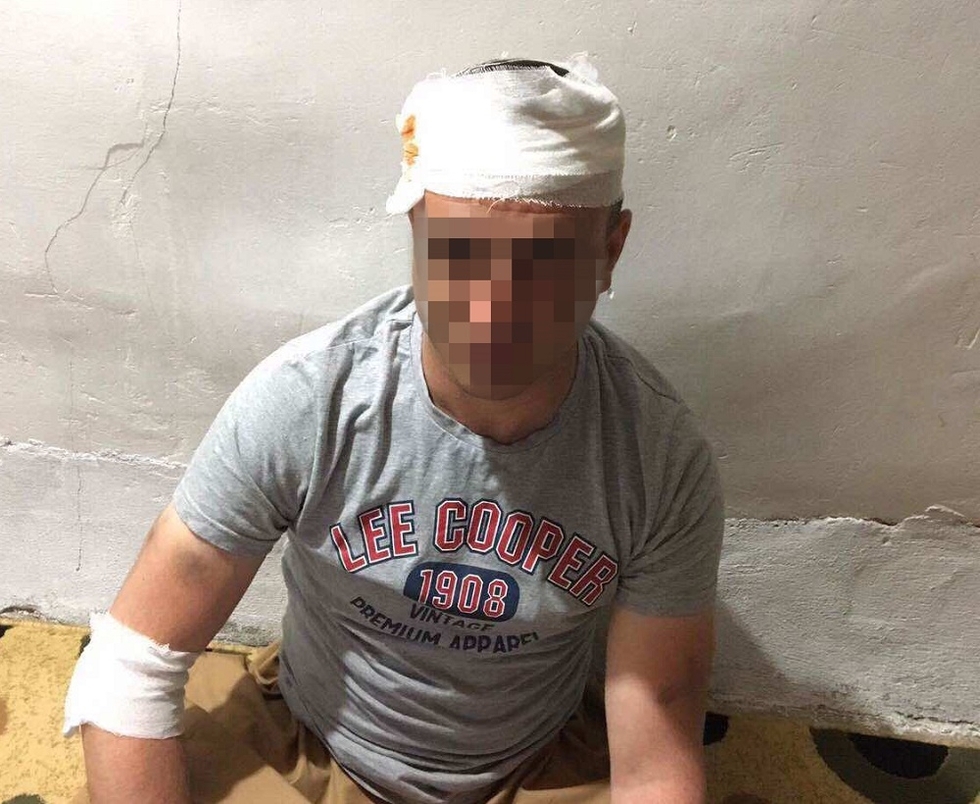
An Iraqi asylum seeker claims he was injured, hooded, handcuffed and locked inside a plane toilet while being forcibly removed from the UK to his home country, a war zone where he says his family has been abducted by the Islamic State (IS) group.
Aras Ismail was removed last week, after spending 10 years trying to gain asylum fearing persecution and death threats as a Kurd in Kirkuk.
The 32-year-old was picked up by the UK border agency in Gloucester in March and removed on 11 April on a Royal Jordanian flight shadowed by three British guards. He spent several weeks in Morton Hall and Harmondsworth detention centres before his forced removal.
Refugee activists told Middle East Eye that Ismail said he was hooded and handcuffed by the guards - which caused bruising still visible a week later - as he begged them not to remove him, fearing death in Iraq.
He was then moved to a toilet inside the plane and spent the duration of the five-hour journey to Amman in his handcuffed, hooded and injured state. From Amman, he was flown to Baghdad, where he was allowed to sit at the back of the plane unbound.
Ismail's lawyer condemned his treatment and said that she intended to "seek a full explanation and compensation for the maltreatment he has suffered".
Royal Jordanian denied Ismail was locked in a toilet but said he was handcuffed. The Home Office said it did not comment on individual cases, but confirmed various restraining techniques were permitted during removals "as a matter of last resort and for the shortest possible time".
In a voice recording heard by Middle East Eye, Ismail told family members: "British security guards had treated me inhumanely by locking me inside a toilet with my legs and arms handcuffed."
He added he was locked up to prevent other passengers from hearing his protests, and that treatment by his guards had led to injuries on his arms and head.
Ismail is now in hiding in Iraq as he fears for his life if sent back to Kirkuk, a town in northern Iraq which, while currently under the control of the Kurdistan Regional Government, has suffered a number of attacks by IS in recent months.
Shortly before his removal, Ismail told MEE he feared for the safety of his mother and father, who had disappeared from his hometown two months ago and may have been abducted by IS. "I don't know where they are," he said.
Refugee activists say Ismail's case is indicative of the treatment of many others who have had their asylum claims denied in the UK, and believe up to 30 others face similar treatment when they are removed in the next few weeks.
The British government regards Kirkuk, despite its proximity to Mosul and ongoing threats posed by IS militants, as a safe destination for failed asylum seekers.
But Dashty Jamal, of the International Federation of Iraqi Refugees (IFIR), said his organisation condemned the forced removal of Iraqis "at a time when Iraq is in a state of war".
"The Iraqi people are still paying the price for the imperialist actions of the British and American governments," said Jamal. "We ask all freedom-loving people to stand against these actions, and we call on the British government to immediately halt the deportation."
Jamal said that many Iraqi refugees held in the UK would be leaving families and loved ones behind in the UK.
The organisation said it feared many were due to be removed on a government-organised charter flight - a technique which has not been used in Iraqi removals since 2011.
If these reports are true, then I would intend to seek a full explanation and compensation
- Jennifer Obusaki, Ismail's lawyer
The IFIR said the Iraqi government had reneged on a policy of refusing to accept Iraqis forcibly returned from Europe.
"British and Iraqi authorities are now thought to be cooperating, with the Iraqi authorities even being granted access to refugees while in detention."
Obusaki, a solicitor who represented Ismail, said she would seek a full explanation for her client's treatment.
"If he was disrupting the flight then the authorities should have put him on an alternative flight," she told MEE.
"I don't have the full details, but if these reports are true, then I would intend to seek a full explanation and compensation for the maltreatment he has suffered."
Harsh treatment denied
Royal Jordanian told Middle East Eye that Ismail was handcuffed and accompanied by three British law enforcement officials on its flight.
But the airline said Ismail had his handcuffs removed after he boarded the flight.
The airline denied that Ismail was locked in a toilet, adding he was "served and treated the same as any other passenger under the surveillance of British immigration officers and the Jordanian sky marshals".
"This incident of locking the passenger inside the toilet did not happen and this never happened in any of RJ’s flights."
The Home Office said it did not comment on individual cases but acknowledged that it was difficult to remove people to "some countries in the world because of the security situation".
Refugee support groups told Middle East Eye that at least 30 Iraqi refugees face removal in the next few weeks. Many were of Kurdish origin and expressed concerns for their safety returned to Iraq.
Ismail was 'served and treated the same as any other passenger'
- Royal Jordanian airlines
Immigration lawyers who spoke to MEE on the condition of anonymity said that there were rumours of a charter flight being organised to remove refugees to both Iraq and Afghanistan.
Ismail's case suggests a U-turn by Iraqi authorities, which banned airlines in 2011 from returning failed asylum seekers to the country.
That ruling in parliament came after the UK was in 2003 forced to take back 30 asylum seekers when Iraqi authorities refused their entry.
The flights involve the government contracting private airlines, which according to one former government minister, costs more than £5,000 ($6,000) per person.
Pro-migrant activists attempted to stop a charter flight filled with asylum seekers in a protest at Stansted airport last month.
In 2016, more than 30 flights forcibly removed thousands of refugees from Britain to countries including Pakistan, Albania, Nigeria, and Ghana.
The British government was also criticised for returning thousands of Iraqi refugees that came to Britain when they were children.
Figures obtained by the Bureau of Investigative Journalists showed that over the course of nine years, more than 600 Iraqi refugees who spent their childhood in Britain were being removed once they had turned 18.
Physical mistreatment of Iraqi Kurds at Baghdad airport, sectarian violence, and al-Qaeda bombings led the European Court of Human Rights in Strasbourg to intervene in 2011, blocking removals on the grounds that many areas remained too dangerous.
Stay informed with MEE's newsletters
Sign up to get the latest alerts, insights and analysis, starting with Turkey Unpacked
Middle East Eye delivers independent and unrivalled coverage and analysis of the Middle East, North Africa and beyond. To learn more about republishing this content and the associated fees, please fill out this form. More about MEE can be found here.


